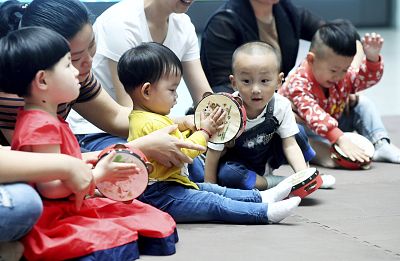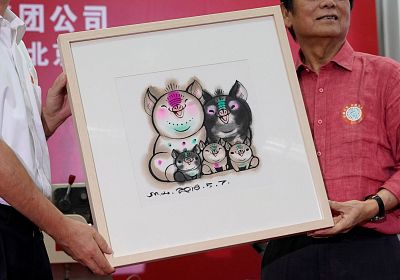After decades of draconian restrictions around family planning, China is now encouraging couples to have more kids as a matter of patriotic urgency.
BEIJING — For nearly 40 years, the Chinese government harshly restricted childbearing through the one-child rule in order to control population growth. That may soon change.
Beijing appears to be on the cusp of abolishing all of its family planning rules — and is even encouraging young couples to have more children as a matter of patriotic urgency.
But attitudes toward parenthood have changed. Even though there is a two-child policy in place now, many Chinese still don't want to have more than one child — or any at all.
"I think having one child is enough," said Chen Yiwen, a 25-year-old accountant and newlywed. "I won't be tempted to have more — even if the family planning policy is abolished."
Chen is not the only woman in the country who shares that sentiment — and that has China's ruling Communist Party worried.
She said that she and her husband, a 27-year-old midlevel bank manager, are settling into married life in Xining, a city with 2.2 million people on the Tibetan plateau in central China. For now, they are focusing on "enhancing our self-value" and their careers.
"Besides, we already have two little babies — a poodle and a corgi," she said.
'A distorted sex ratio'
Chen is part of what has been dubbed the "lonely generation," those born under the one-child rule.
As China's population ballooned to close to one billion in the 1970s, the government became concerned about the impact that would have on its plans for rapid economic growth.
So Beijing introduced the one-child policy in 1979. People who defied it faced hefty financial penalties and some civil servants lost their jobs. But much worse, many women faced the horror of sterilization and forced abortions.
“The production brigade went to my home and took all valuable things from us including the iron pot and removed the door of our house.”
Beijing claims that 400 million births were prevented as a result of the policy from 1980 to 2005.
But the the rule's strict enforcement was seen as a violation of human and reproductive rights by critics.
As a result of China's traditional preference for male offspring, especially in rural areas, many woman who were carrying female babies were forced to get abortions.
Chinese doctors performed more than 330 million abortions and 196 million sterilizations since 1971, according to official data from the Chinese Health Ministry released in March 2013 and reported by the Financial Times and other international news organizations.
If the mothers did give birth, girls were often abandoned, placed in orphanages or given up for adoption abroad.
By the end of 2014, China had 33.76 million more males then females. For every 100 girls, there were 116 boys.
"The policy clearly skewed the population structure in many ways," said Cai Yong, a professor who focuses on Chinese demographics at the University of North Carolina at Chapel Hill. "The Chinese population is aging very fast, and China has a distorted sex ratio."
Data shows that in 1980, people 65 and older accounted for just 4.7 percent of the Chinese population. That percentage grew to 10 percent in 2015, and is projected to surge to 33 percent by 2050, according to United Nations figures.
China's average birth rate fell to a record low of 1.04 in 2015, among the lowest in the world. In contrast, the U.S. birth rate in the U.S. was 1.80 last year, according to the World Bank.
Beijing fears that the aging population will have an adverse effect on the economy as the number of young workers shrinks and the government has to shoulder pension costs for the elderly.
'Too little, too late'
In 2015, China finally terminated the one-child policy and started to allow people to have two children.
However, the new policy hasn't achieved its goal. In 2017, the number of newborn babies actuallyfell by 3.5 percent, according to the country's statistics bureau. As many as 630,000 fewer babies were born that year, despite the loosening of restrictions.
According to Cai, the two-child policy was "too little, too late."
The government seems to agree and has indicated that it may soon do away with family-planning policies altogether.
The National Health and Family Planning Commission, the body that oversaw population control for almost 40 years, was unceremoniously closed down this year.
Then in August, the People's Daily, the Chinese Communist Party's official newspaper, published an op-ed, "Childbearing is a family matter as well as a national matter."
It called on citizens to have more children and warned that "the impact of low birth rates on the economy and society has begun to show."
Beijing also revealed a new postage stamp ahead of the Year of the Pig showcasing a happy family consisting of two pig parents and three piglets.
The stamp was interpreted as a nod by the government to the potential further relaxation of the two-child policy.
Financial strain
However, the decades of restrictions have changed how many Chinese people feel about having children.
"The one-child policy for the past few decades completely changed people's birth concept. From kindergarten, they think one child is very normal," said Yi Fuxian, a population expert at the University of Wisconsin-Madison. "Now it's hard to restore the family value and respect for life."
Many of the young couples and women NBC News spoke to cited the expense of education, health care and housing among the reasons for not having more than two children, even if restrictions are loosened.
And for many, the scars from living through the one-child policy are a still a bit raw.
Wu Shuai, 27, said he and his wife had discussed having kids, but agreed not to for at least three years.
"The cost of raising children now is so high. Medical treatment, education and children in China are taking numerous extracurricular tutoring classes," Wu said. "Parents bear huge burden and pressure."
He marveled at how much things had changed since his family broke the one-child policy when his younger sister was born. "The production brigade went to my home and took all valuable things from us, including the iron pot, and removed the door of our house," he said.
He also recalled how when a classmate's family had too many children, they had to move to another village to hide. "They couldn't go back home. That was 15 or 16 years ago," Wu said.
News
His wife, Tang Tang, 24, said she hoped to have two children — a boy and a girl. "I feel that it is a responsibility, because the state's policy is beneficial for the society, and it is necessary to respond to national policies," she said.
For Zhang Haijian, a 42-year-old Russian language guide in Beijing, even one child feels like a strain. He said that he and his wife were already overwhelmed by the cost of education, health care, housing and caring for their elderly parents.
"To be honest, raising one child is too much burden for us," he said.
His wife, Sun Yumin, 41, agreed.
"Why don't I want two children?" she said. "Because I don't think it's necessary. It will erode my own life."
"Only children are definitely lonely," Zhang chimed in. "But if my child is not lonely, I will be screwed," he laughed. "I would be worked to death."
To others, the shifting policies appear like an insult.
"Women were told not to have children, now we are told to have children," said Doro Zhang, 24, a single women from Guangzhou, a sprawling city of 14 million near Hong Kong. "It made me feel our country never really respected women."
Dawn Liu reported from Beijing, and Petra Cahill from London.













